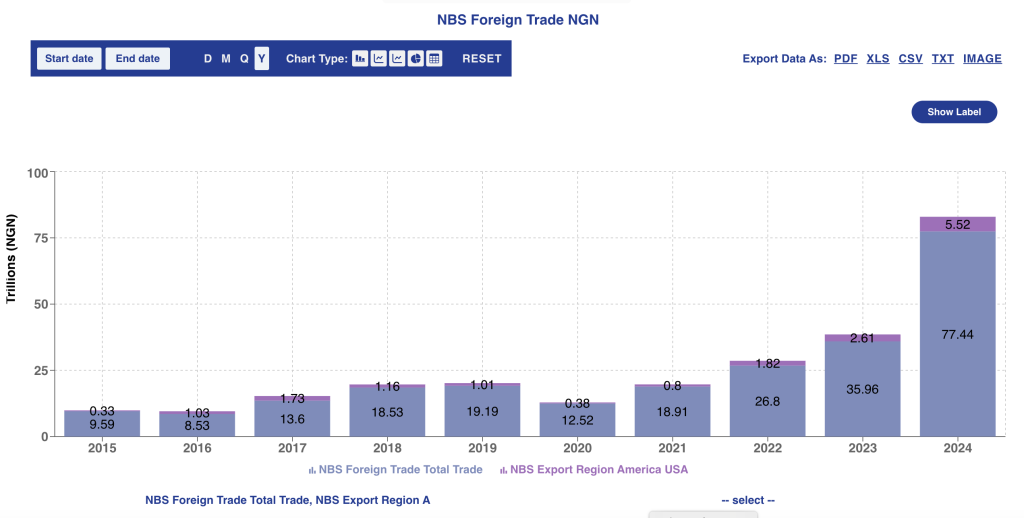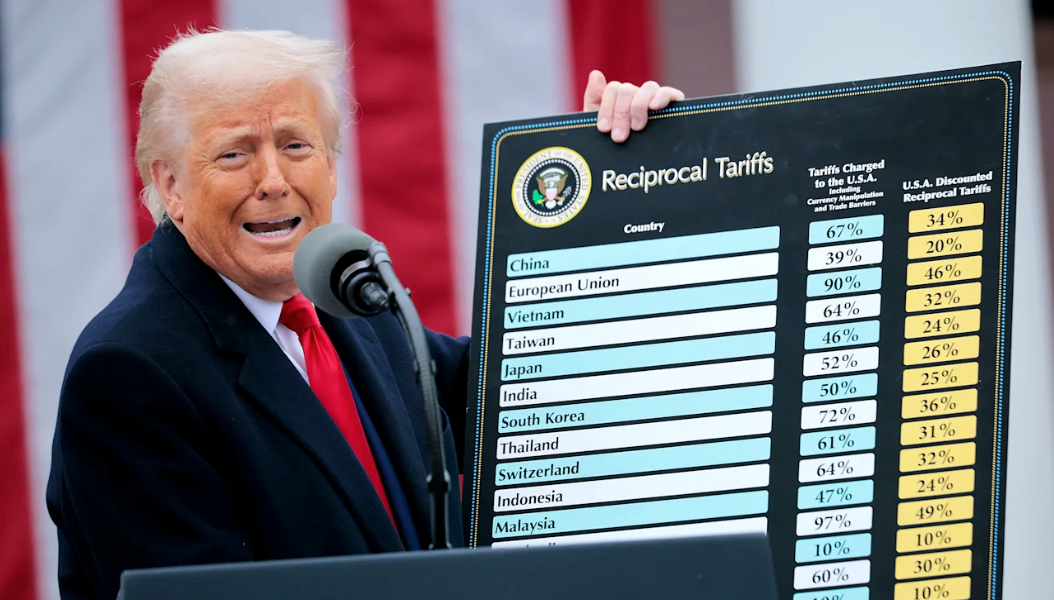Quick Summary: U.S. President Donald Trump has imposed a 14% tariff on Nigerian exports to the U.S. as part of a broader trade policy overhaul. The move introduces reciprocal tariffs, affecting over 50 countries, including several African nations. This shift could significantly impact Nigeria’s trade dynamics and economic policies.
Trump Imposes 14% Tariff on Nigerian Exports to the U.S.
A Major Shift in U.S. Trade Policy
In a bold move that could reshape global trade, U.S. President Donald Trump has announced a new tariff policy, imposing a baseline 10% tariff on all U.S. imports. Additionally, country-specific reciprocal tariffs will be applied to nations that impose higher duties on American goods.
Under this new policy, Nigerian exports to the U.S. will now attract a 14% tariff, in response to the 27% tariff the U.S. government claims it faces from Nigeria.
Nigeria-U.S. Trade at a Glance
According to data from Nigeria’s National Bureau of Statistics (NBS), trade between Nigeria and the U.S. amounted to N31.1 trillion between 2015 and 2024. Imports during this period totaled N16.4 trillion, representing 8.7% of Nigeria’s global exports.
Trump announced the tariff adjustments during a Rose Garden event titled “Liberation Day,” signaling a significant departure from decades of free trade policies that have defined global commerce since World War II.
Trump’s Justification for the Tariffs
The U.S. President framed the new tariffs as a step toward “fair trade,” pledging to boost American industry and open up foreign markets that, in his view, have long been unfairly restricting U.S. exports.
“This is one of the most important days in American history,” Trump declared. “We will supercharge our domestic industrial base, we will pry open foreign markets and break down foreign trade barriers.”
Countries Affected by the New Tariffs
The new tariffs, which take effect immediately, apply to over 50 countries, including major economies such as China, the European Union, India, Japan, and several developing nations in Asia, Africa, and Latin America.
Among African nations, Nigeria, Ghana, Ethiopia, and Mauritius have been identified for tariff adjustments. Nigeria currently imposes a 27% tariff on U.S. goods, prompting the U.S. to apply a 14% reciprocal tariff on Nigerian exports. While Nigeria is not among the highest tariff-imposing nations, the move suggests a broader U.S. strategy targeting both economic rivals and developing nations with preferential trade agreements.

Impact on African Nations
Mauritius faces one of the steepest adjustments, with its current 80% tariff on U.S. goods leading to a proposed 40% U.S. tariff in return. Ghana and Ethiopia impose relatively lower tariffs of 17% and 10%, respectively, and will see corresponding U.S. tariffs of 10% each.
Other African nations affected include:
- Algeria: 59% tariff on U.S. goods; 30% reciprocal U.S. tariff
- Namibia: 42% vs. 21%
- Lesotho: 99% vs. 50%
- Kenya: 10% vs. 10%
These adjustments could significantly impact African economies that rely on U.S. trade preferences, particularly under the African Growth and Opportunity Act (AGOA). Countries that fail to revise their tariff policies or renegotiate trade terms may face greater barriers to accessing the world’s largest consumer market.
Key Global Tariff Adjustments
Trump’s tariff strategy extends beyond Africa, affecting several Asian and South American nations:
| Country | Tariff on U.S. Goods | Proposed U.S. Tariff |
|---|---|---|
| Vietnam | 90% | 46% |
| Cambodia | 97% | 49% |
| Bangladesh | 74% | 37% |
| China | 67% | 34% |
| Thailand | 72% | 36% |
| Indonesia | 64% | 32% |
| India | 52% | 26% |
| Taiwan | 64% | 32% |
| South Korea | 50% | 25% |
| Japan | 46% | 24% |
| Malaysia | 47% | 24% |
| South Africa | 60% | 30% |
| Sri Lanka | 88% | 44% |
| Israel | 33% | 17% |
| Philippines | 34% | 17% |
| EU | 39% | 20% |
| UK | 10% | 10% |
| Brazil | 10% | 10% |
| Singapore | 10% | 10% |
| Chile | 10% | 10% |
| Australia | 10% | 10% |
| Turkey | 10% | 10% |
| Pakistan | 58% | 29% |
| Colombia | 10% | 10% |
The Concept of Reciprocal Tariffs
At the core of Trump’s new trade policy is the idea of “reciprocal tariffs”, which imposes U.S. duties at half the tariff rates imposed by foreign countries on American goods. A chart displayed during the “Make America Wealthy Again” event highlighted countries deemed to have the most extreme tariffs against U.S. products.
Vietnam, Cambodia, and Bangladesh, for instance, levy tariffs exceeding 70% on U.S. goods. Under Trump’s new trade policy, these countries will now face U.S. import tariffs ranging between 37% and 49%.
Implications for Nigeria and Global Trade
For Nigeria and other nations seeking to expand their export markets beyond crude oil, these tariff adjustments present both challenges and a wake-up call. Without proactive renegotiation of trade terms or adjustments to their own tariff policies, many economies risk losing competitive access to the U.S. market.
As the global trade landscape shifts, businesses, policymakers, and trade negotiators must act swiftly to navigate these new barriers and explore alternative markets to sustain economic growth.



















Leave a Reply